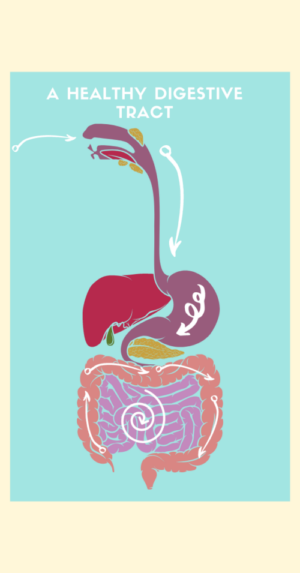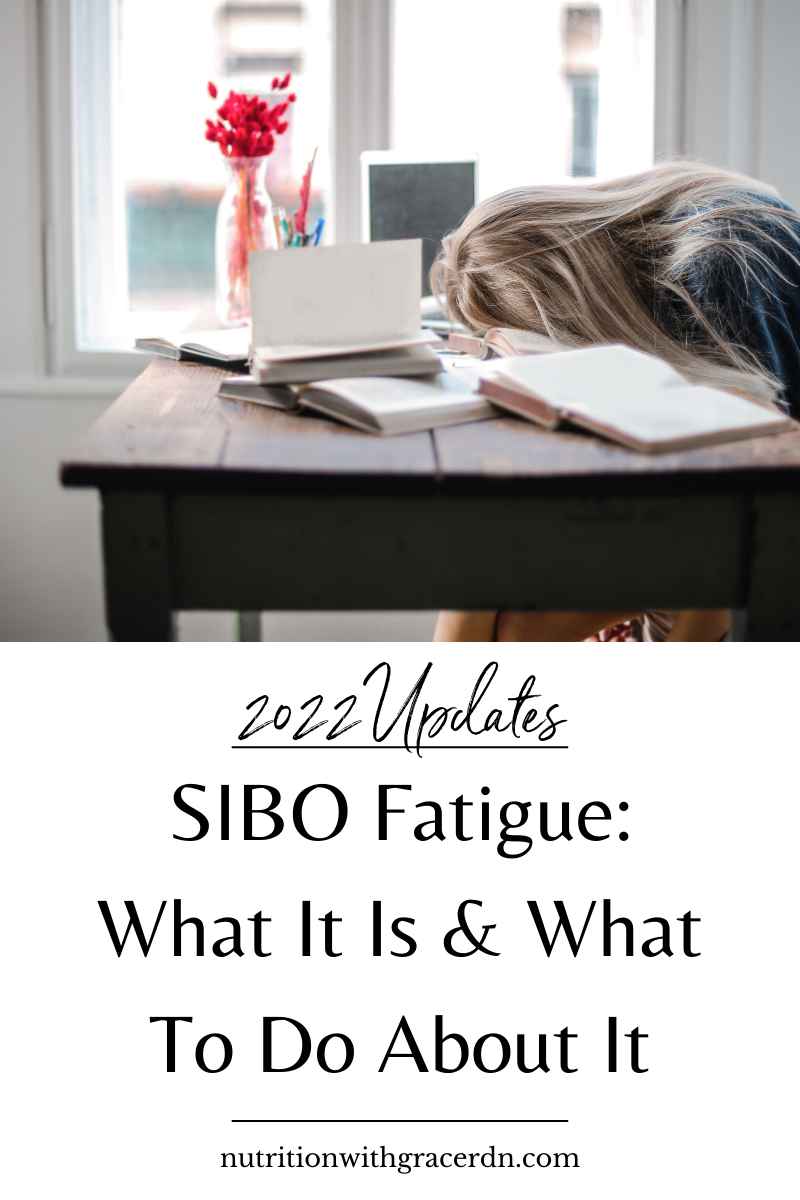table of contents
What is SIBO fatigue? You’ve obviously heard of it or you wouldn’t be here, but do you know what it actually means? This article will breakdown what SIBO (small intestine bacterial overgrowth) is, how it relates to fatigue, and provide actionable strategies for combating the two.
But first, let’s look at how your digestion is supposed to work.
What Does a Healthy Gut Look Like?
Your digestive system starts in your mouth and continues through your esophagus, stomach, small intestine and finally your large intestine. Other organs, such as the pancreas, liver, and gallbladder supply enzymes and other materials essential for breaking down and absorbing nutrients so they can be used throughout the body. (1)
This is a complex process with a lot of moving parts, so let’s focus on the small intestine.
In a healthy system, the small intestine contains very little microorganisms compared to the large intestine or colon (2, 3). In fact, it’s almost sterile. The microbes in the colon are then responsible for processing (via bacterial fermentation) the remaining dietary fiber, starches, and small proteins that survived earlier digestion.
This fermentation process leads to the production of short chain fatty acids, such as butyrate. Having a healthy amount of butyrate improves the immune system, helps lower cholesterol, improves insulin sensitivity, protects against heart disease, and helps you feel full. (4, 5)

**(For a more in-depth look at normal digestion, check out this article on how to increase stomach acid.)**
On the other hand, the small intestine does not require the help of microorganisms to process the food you eat. This is because it is the primary site of active nutrient breakdown and absorption. In fact, the presence of microorganisms in the small intestine is what leads to uncomfortable digestive symptoms such as gas, bloating, constipation/diarrhea, etc.
Our bodies have several defense mechanisms in place to prevent bacteria from other parts of the digestive tract from invading the small intestine, but sometimes they don’t work. SIBO occurs when one or more of these mechanisms fail. (2, 6)
What is SIBO?
SIBO, or small intestine bacterial overgrowth, occurs when there are too many bacteria present in the small intestine. (2)
The symptoms of SIBO are so prevalent in so many conditions that it can be hard to identify SIBO as the cause.
The increased amount of bacteria causes unabsorbed carbohydrates to ferment in the small intestine. This fermentation creates gases such as hydrogen, methane, and hydrogen sulfide, as byproducts. The presence of these gases interferes with proper digestion and absorption and leads to symptoms of SIBO. (2, 6)
Digestive symptoms of SIBO
- Constipation, diarrhea or both
- Bloating
- Gas/Belching
- Heartburn
- Undigested food in stool
- Food sensitivities or intolerances
- Nausea
- Nutrient deficiencies
- Abdominal pain or cramping
- Unintended weight loss
Non-digestive symptoms of SIBO
In addition to the digestive symptoms listed above, there is growing evidence to show the following mood-related symptoms are also be related to bacterial overgrowth in the gut: (7)
- Anxiety
- Depression
- Brain fog
- Chronic Fatigue
Risk factors for SIBO
There are also certain things that can put you at higher risk of developing SIBO.
The most common risk factors include: (2, 8, 9, 10)
- High levels of stress
- Low stomach acid
- Including from long-term PPI use (medications that decrease acid in the stomach to control heartburn)
- Multiple courses of antibiotics
- Previous bouts of food poisoning
- Prior bowel/abdominal surgery
- Slow gut motility
- Gallbladder removal
- Diabetes
- Celiac Disease
- Crohn’s disease
- Lupus
- Hypothyroidism
- Narcotic medications
If you fall within one or more of these risk factor groups, are experiencing any combination of digestive/mood symptoms AND haven’t been able to find relief on your own or with your doctor, it’s worth looking into whether SIBO is the culprit.
Testing for SIBO isn’t as important as knowing what’s causing the bacterial overgrowth to begin with, which is why it’s important to work with an experienced practitioner. They can help you interpret your symptoms, offer professional insight and support, and monitor you through a treatment plan.
The Connection Between SIBO & Fatigue
Now that we’ve broken down how a heathy small intestine works, what SIBO is and the primary symptoms and risk factors for it, it’s time to dive into its relation to fatigue.
The gut and the brain are connected via the gut-brain axis, which allows for bidirectional (two-way) communication between the two. Research on how the gut-brain axis works is still developing, but essentially the health of your gut environment can directly and indirectly impact your energy levels, your mood, your ability to concentrate, and so much more. (7, 11)
There is also emerging evidence to show that the health of the gut microbiota (i.e. the gut environment) can even impact how quickly someone will recover after a stroke. (11) Pretty amazing, huh!
Other potential connections include: (12)
- Nutrient deficiencies
- Not eating or absorbing enough calories
- Low gut diversity
- Gut permeability (aka “leaky gut”)
What does the research say?
Being deficient in various nutrients can lead low energy and fatigue. But vitamin B12 is one nutrient to pay particular attention to.
B12 is an essential vitamin, meaning we can only get it through our diets. It has several functions in our body, one of which is red blood cell formation. Red blood cells are what carry oxygen throughout our bodies and help provide us with energy. B12 is also only absorbed in one place, which is at the end of the small intestine. (13)
Therefore, if SIBO persists for a long enough period of time it is possible to develop a vitamin B12 deficiency. (14) Because B12 is so important in the formation of red blood cells, not absorbing enough B12 can result in low energy and fatigue. (13)
Research also tells us that people with chronic fatigue syndrome (CFS) — characterized by unexplained long-term extreme fatigue — have been shown to have higher rates of bacterial imbalances in their gut, aka dysbiosis. (7) This likely means that those who suffer from CFS are more likely to also suffer from irritable bowel syndrome (IBS).
There is also emerging research that is considering CFS to be in the same disease family as IBS. (15) This means the two conditions are believed to be related.

What Can You Do About It?
The best way to address your fatigue is to address your SIBO first. But I’m going to be brutally honest with you and tell you that treating SIBO can be long and complicated. It’s soooo important to find a practitioner who has experience in this area and who is not pushing a one-size-fits-all approach.
SIBO treatment
As mentioned above, SIBO testing is not as important as figuring out what lead to SIBO developing in the first place. This is the only way to find long-term relief and prevent SIBO from reoccurring. Look for someone who is getting back to the basics and asking the right questions.
A few examples of these questions include:
- Are you having daily bowel movements?
- When does your bloat usually occur – right after eating, 1-2 hour after eating, gets worse throughout the day?
- Have you tested for low stomach acid?
- What are your stress levels before, during, and after meals?
- Are you getting 8-9 hours of sleep each night? If not, why?
- Are you always hungry?
- Can you pinpoint when your symptoms started?
You must lay your “gut health foundation” before you can move on to more specialized treatment options.
These options will include diet/lifestyle recommendations, supplements (like prebiotic fiber, probiotics, gut lining support, etc.), herbal antimicrobials, and/or prescription antibiotics.
Final Thoughts
Are you experiencing chronic and persistent exhaustion day in and day out? Are you tired of relying on caffeine and other quick fixes for energy? The answer may lie in your gut.
Our bodies are made up of amazing, interconnected systems that accomplish so much. Unfortunately, this also means that if one system isn’t working correctly, the systems around it will be affected as well. The connection between SIBO and fatigue is a perfect example of this.
All in all, the only way to find relief is to start digging deeper with the help of a trusted healthcare provider or team in order to track down and address what lead to the overgrowth in the first place.

want this article?
download now, reference later!
jumpstart your journey to better gut health
Print Resources
- Mahan lK, Escott-Stump S, Raymond JL. Krause’s Food and the Nutrition Care Process. 13th ed. St. Louis, MO: Elsevier Saunders; 2012: 2-3.






